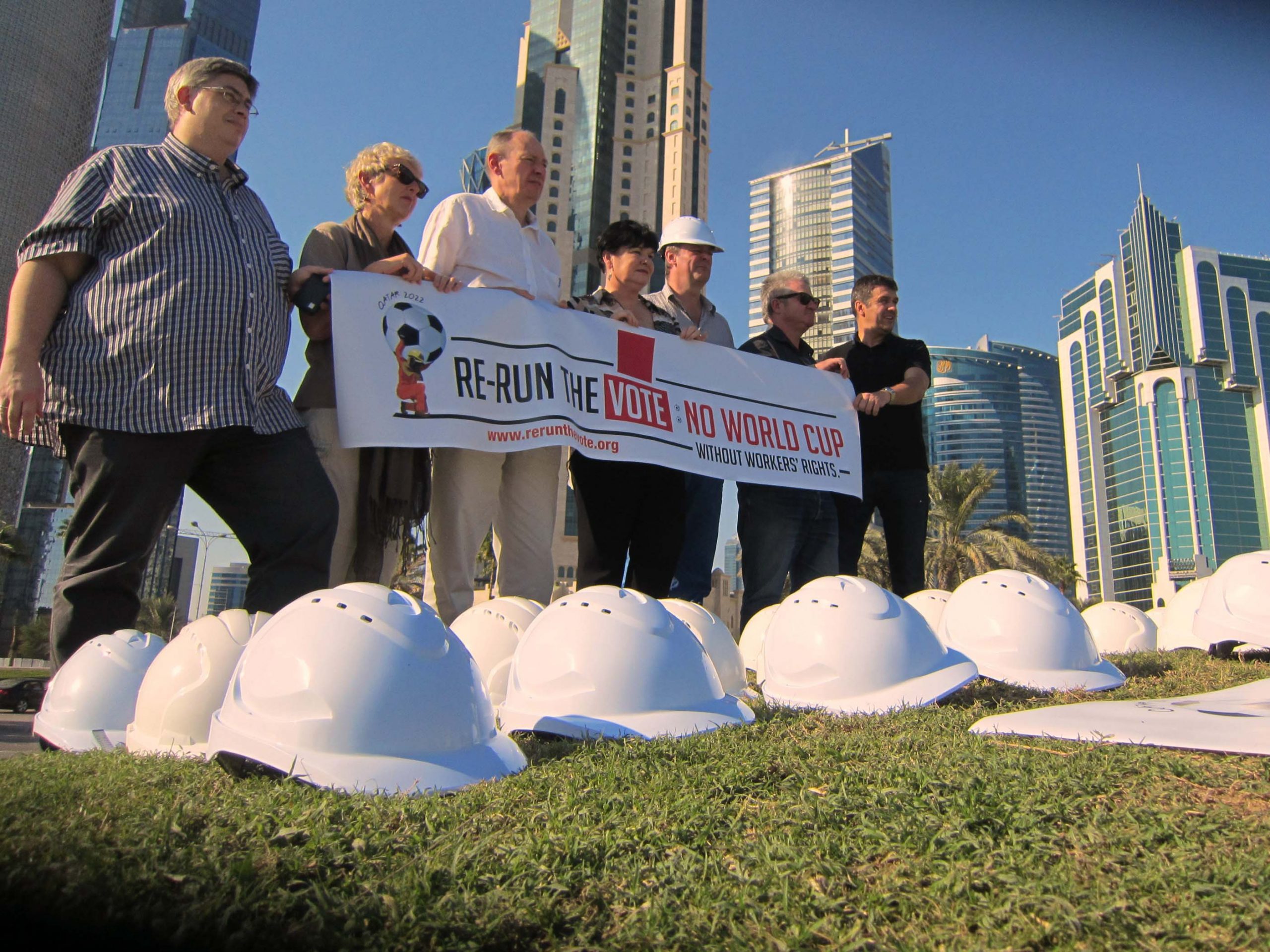
Tomorrow, Dec. 2, will be the third anniversary of Qatar winning hosting rights to the 2022 World Cup. To mark the occasion, an international trade union today held an event to draw attention to the plight of migrant workers and press for reforms.
This afternoon, members of the International Trade Union Confederation laid out 30 white hardhats on a grassy hill in Sheraton Park, and held a moment of silence for the 30 Indian and Nepalese workers it says die each month in Qatar.
“This should change. This nation must change,” said ITUC general secretary Sharan Burrow, later adding that the fatality figures came from the embassies of the respective countries.
She also reiterated her position that World Cup hosting rights should be taken away from Qatar unless the government pledges to abolish its sponsorship, or kafala system, allows workers to form unions and introduces a minimum wage.
Footballers’ goals
Over the weekend, representatives from an international organization representing football players made similar demands during a meeting with Hassan Al Thawadi, secretary general of the Qatar 2022 Supreme Committee.
Yesterday, FIFPro said it wanted the kafala system scrapped for footballers and called the establishment of a professional players’ union in Qatar “essential.”
“As of right now, the players who FIFPro protect cannot be guaranteed their rights will be respected. That has to change,” said FIFPro board member Mads Oland in a statement.
FIFPro is also co-hosting a press conference in Paris on Tuesday with French-Algerian footballer Zahir Belounis, who was granted permission to leave Qatar last week after being prevented from exiting the country for 10 months amid a contract dispute.
ITUC has also lobbied on behalf of Belounis, and on Sunday Burrow said his plight is indicative of the conditions faced by many in Qatar.
“Zahir is the representative of the powerlessness of 1.3 million workers,” she said.
Chorus of critics
ITUC has been a longstanding critic of Qatar’s treatment of migrant workers and has filed multiple complaints to the International Labour Organization.
Sunday’s press conference was the latest media event organized by activists, using the World Cup spotlight to press for changes to Qatar’s labor laws and enforcement mechanisms. In recent weeks, Amnesty International, the United Nations and trade union BWI have all visited the country and made similar recommendations.
In the case of the Amnesty report, researchers noted that abuses were just as likely to be perpetrated by expat managers of companies as they were Qataris.
Burrow and a handful of delegates from construction unions in Australia, Austria and the United Kingdom arrived in Qatar on Friday and spent the weekend meeting with workers, visiting labor camps and talking to other human rights advocates.
They also met with Qatar’s National Human Rights Committee and offered to work with the government to help it introduce reforms if it makes “a commitment to end the system of slavery.”
Burrow said this was her fourth trip to Qatar and that from her perspective, things are getting worse for workers. She said she spoke with five men who had signed employment contracts before coming to Qatar, only to find out upon arrival that they didn’t actually have jobs and would have to find work.
“This is labor trafficking,” she said.
Burrow said she also spoke to workers who had not been paid by their employer, a problem that Amnesty International examined in depth as part of extensive report released last month.
Addressing these problems appear to be on the government’s agenda.
Over the weekend, Mohammed Hassan al Obaidly, director of legal affairs at Qatar’s Ministry of Labor, said his department had submitted a proposal to the Council of Ministers to stiffen penalties on companies that violate workers’ rights, the Tribune reported.
Thoughts?







